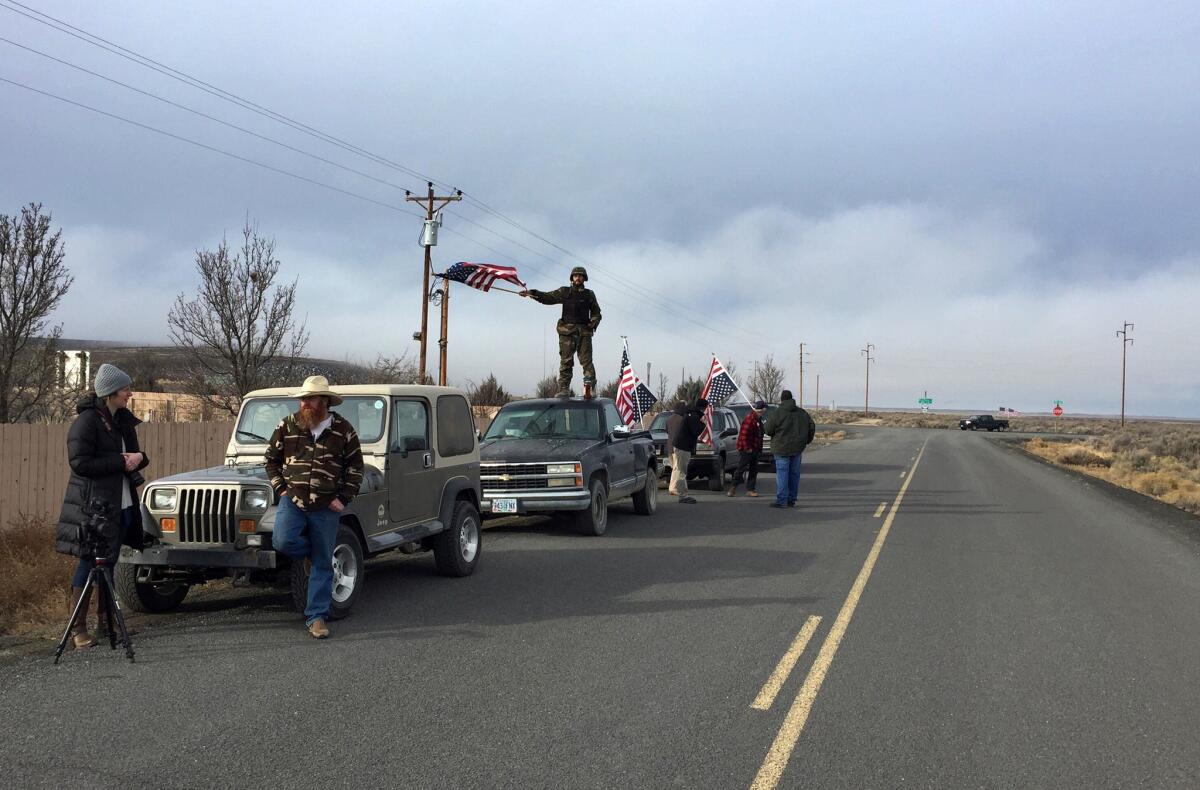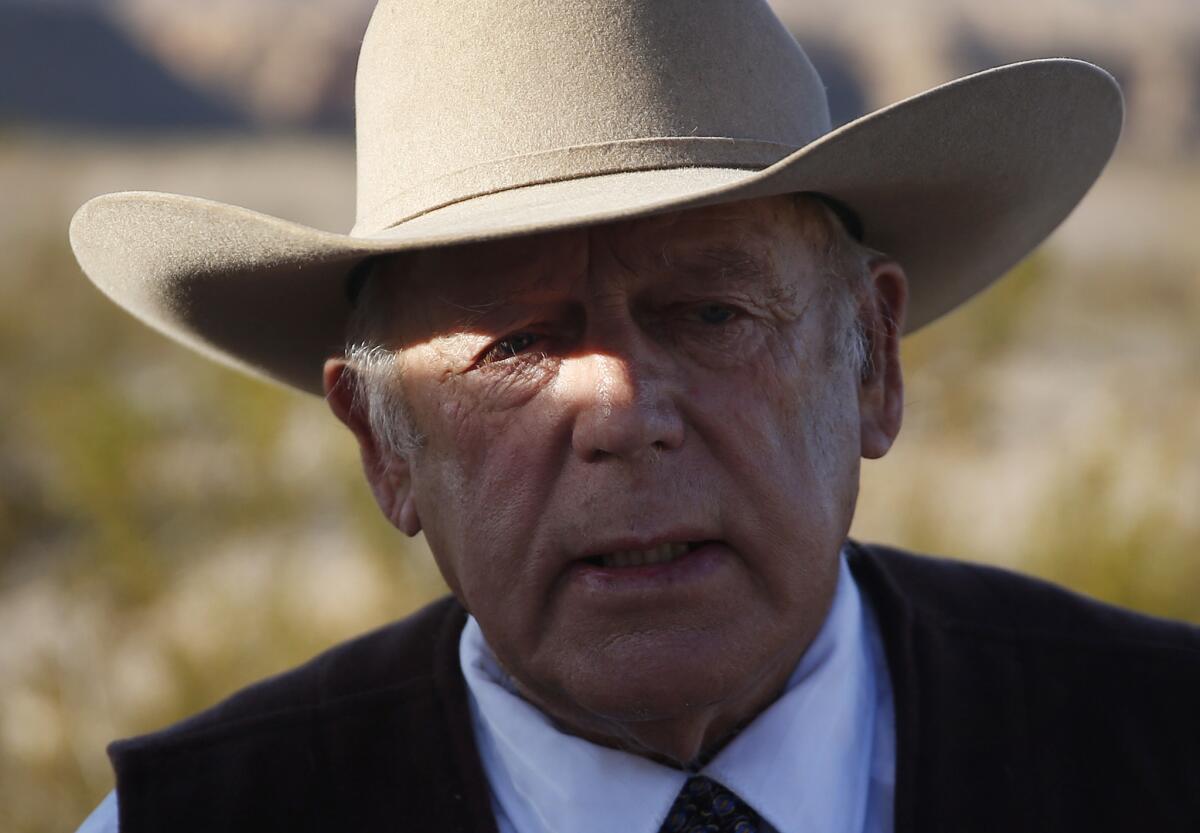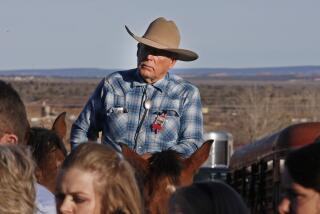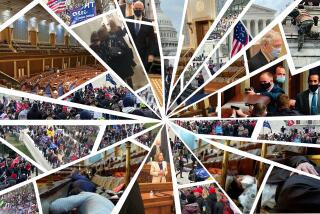Last Oregon refuge occupier surrenders peacefully, after some tense final moments

People wave American flags near the Malheur National Wildlife Refuge in Oregon as negotiations were underway that led to the surrender of the last four occupiers.
- Share via
It came down to one young man.
“Let me take my stand,” he said. “This isn’t something I’m going to back away from.”
For 80 excruciating minutes on Thursday morning, David Fry, a 27-year-old dental technician from Ohio, was alone in a remote wildlife refuge in Oregon, though he had perhaps never been so embraced.
He was surrounded by police, the world was listening live online, a group of conservative state lawmakers had come to show their support, as had a prominent evangelist. Self-described constitutional activists spoke to him by phone, urging him to surrender.
“You guys are going to have to probably kill me or watch me kill myself,” Fry said, speaking to an FBI negotiator, but also to tens of thousands of people following along on YouTube to a phone call live-streamed by one of the activists.
During nearly six dramatic weeks of the armed standoff at the Malheur National Wildlife Refuge, one man had been killed by police and a dozen others had been arrested on federal conspiracy charges. Just the night before, Nevada rancher Cliven Bundy had also been arrested at the Portland airport, apparently on his way to show support for his incarcerated sons and those at the refuge.
The militants who had initially led the occupation, including two of Bundy’s sons, said it was a bold show of their opposition to federal policies on public lands — that they were at the front of a movement thousands of people would join. Yet as the standoff diminished to just a few final and often frantic holdouts, it also became a platform for Fry and others to express — frequently in profane and contradictory terms — a sense of alienation in a country whose culture and priorities they said did not reflect theirs.
After three other holdouts surrendered Thursday morning, at least one carrying an American flag, only Fry remained. He said he was angry and confused. He said he feared being sexually assaulted in prison. He said the government was corrupt. Why, he asked, could he not legally smoke marijuana in his home state? Why should his tax dollars fund a government that helps pay for abortions and war in the Middle East? Promise him that will stop.

Rancher Cliven Bundy speaks to reporters on Jan. 27 in Bunkerville, Nev. He was arrested this week at the Portland, Ore., airport, apparently on his way to show support for his incarcerated sons and others who led the armed occupation of the wildlife refuge.
Negotiators, he said, wanted to end the occupation with “clean hands,” but he was not going to let that happen.
“I’m going to give you dirty hands,” he said.
An FBI negotiator named Mark was on one phone, his voice largely undiscernible by online listeners, while a Republican state lawmaker from Nevada, Michele Fiore, the evangelist Franklin Graham and at least two self-described constitutional activists spoke to him as well.
Walk out, they urged him. Go peacefully. That is what Jesus would do. At one point, Fry said he had a gun to his head. Later, he said he was lying in a bed, beneath a blanket. He wanted a pizza.
Then, suddenly, at almost exactly 11 a.m., it was over. No bullets were fired.
“If everybody says hallelujah, I’ll come out,” Fry said. “Will you do that?”
“Everybody’s listening, everybody’s listening,” he said.
Hallelujahs could be heard nearby.
“I’m walking toward them right now,” Fry said.
“Keep walking, my friend — hallelujah,” a new voice, belonging to a man, could be heard telling Fry.
“Slow down,” someone said. “Keep your hands up.”
In a firm but friendly voice, a man said, “Turn around. Keep walking toward the sound of my voice, nice and easy. Right here. Going to put your hands behind your back, OK?”
A man asked, “You got any guns on you or anything?”
“No,” Fry replied.
“Ammo?”
A few more muffled voices and noises could be heard. The call to the live-stream, aired by activist Gavin Seim, ended.
A moment of stunned silence passed before another activist on the line, Kris-
Anne Hall, who had been desperately trying to persuade Fry not to kill himself, said, “Can I cry now, Gavin?”
She sobbed heavily.
“America needs to learn from what just happened here,” Seim said.
The digital-age drama unfolded in striking contrast to the remoteness of the refuge, which spans nearly 200,000 acres in the high desert of eastern Oregon and provides critical habitat for scores of migratory bird species.
On Jan. 2, Ammon and Ryan Bundy led more than a dozen people in an armed takeover of the refuge and the compound of buildings inside it. They initially said they were protesting the prison sentences of two local ranchers found guilty of setting fires that spread to federal land, but their complaints expanded to a broad indictment of federal restrictions on cattle grazing, logging, mining and other land uses.
On Jan. 26, the Bundys and several other occupation leaders were arrested during a traffic stop on a remote stretch of highway north of the town of Burns, which is about 30 miles from the refuge. One of the leaders, Robert “LaVoy” Finicum, whom Fry had met online months before the occupation and had grown to admire, was killed by Oregon State Police during the law enforcement operation.
Ammon and Ryan Bundy and 14 others, including the four holdouts, were indicted last week by a federal grand jury in Portland. Each faces a maximum six-year prison sentence.
Besides Fry, the others arrested at the refuge on Thursday, according to the FBI, were Sean Anderson, 47, his wife, Sandy, 48, both of Riggins, Idaho; and Jeff Banta, 46, of Yerington, Nev. They face the same charges as everyone arrested so far in the case: conspiracy to impede officers of the United States from discharging their official duties through the use of force, intimidation or threats.
The standoff did find sympathy among many people in the rural West; many said they supported the cause but not taking up arms to act on it. Some people mailed packages to the occupiers from far away or brought them dinner.
“As we have said since Day One, our goal has been to end this illegal occupation peacefully, and we are grateful that we were able to do so today,” Greg Bretzing, the FBI special agent in charge of Oregon, said in a statement Thursday afternoon.
The issues highlighted by the standoff are likely to draw continued attention — particularly with the arrest of Cliven Bundy, whose own battle against the government helped inspire it.
Unlike his sons, Bundy was not charged in Oregon but in Nevada. There, in the spring of 2014, he led a tense armed standoff over his refusal to pay the federal government more than $1 million in cattle grazing fees accumulated over two decades.
In court documents filed Thursday, he is accused of using a weapon and leading hundreds of supporters in intimidating law enforcement officers who had arrived to try to seize his cattle from federal wildlands.
Fiore, the Nevada lawmaker, had gathered several other state legislators from around the West and sped toward Burns on Wednesday night in an attempt to intervene and hold off any bloodshed.
By night’s end, most of the holdouts had signaled that they were prepared to surrender Thursday.
Under the arrangements approved in advance by the FBI, the first three agreed to emerge if they were met by Fiore and Graham, son of evangelist Billy Graham and president of the Billy Graham Evangelistic Assn.
Graham spoke to all of the holdouts on the telephone as he and Fiore drove toward the refuge, praying for them on more than one occasion. Finally, he and Fiore entered an armored vehicle with three FBI agents and met the surrendering holdouts as they emerged.
He had promised to “hug” them.
Twitter: @yardleyLAT and @mattdpearce
MORE ON OREGON STANDOFF
Federal indictment says protesters in Oregon occupation ‘threatened violence’
Man killed in Oregon standoff had preached what he called a ‘cowboy’s stand for freedom’
Where was the FBI during the armed standoff in Oregon? Out of sight, but listening and watching
More to Read
Sign up for Essential California
The most important California stories and recommendations in your inbox every morning.
You may occasionally receive promotional content from the Los Angeles Times.












